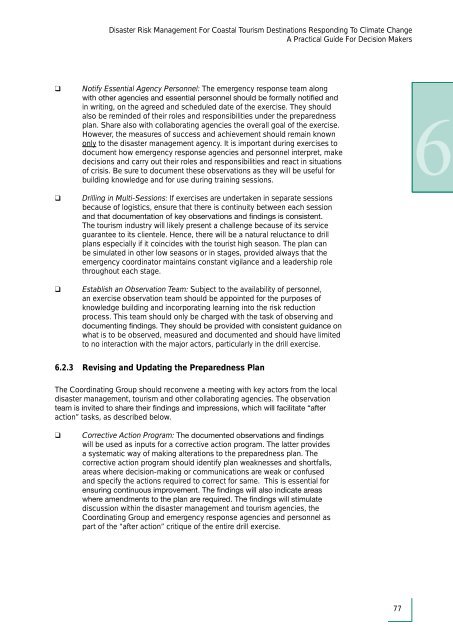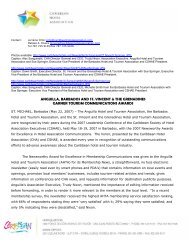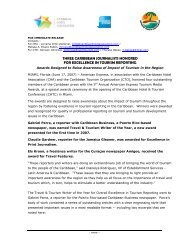Disaster Risk Management for Coastal Tourism - Caribbean Hotel ...
Disaster Risk Management for Coastal Tourism - Caribbean Hotel ...
Disaster Risk Management for Coastal Tourism - Caribbean Hotel ...
You also want an ePaper? Increase the reach of your titles
YUMPU automatically turns print PDFs into web optimized ePapers that Google loves.
<strong>Disaster</strong> <strong>Risk</strong> <strong>Management</strong> For <strong>Coastal</strong> <strong>Tourism</strong> Destinations Responding To Climate Change<br />
A Practical Guide For Decision Makers<br />
<br />
<br />
<br />
Notify Essential Agency Personnel: The emergency response team along<br />
<br />
in writing, on the agreed and scheduled date of the exercise. They should<br />
also be reminded of their roles and responsibilities under the preparedness<br />
plan. Share also with collaborating agencies the overall goal of the exercise.<br />
However, the measures of success and achievement should remain known<br />
only to the disaster management agency. It is important during exercises to<br />
document how emergency response agencies and personnel interpret, make<br />
decisions and carry out their roles and responsibilities and react in situations<br />
of crisis. Be sure to document these observations as they will be useful <strong>for</strong><br />
building knowledge and <strong>for</strong> use during training sessions.<br />
Drilling in Multi-Sessions: If exercises are undertaken in separate sessions<br />
because of logistics, ensure that there is continuity between each session<br />
<br />
The tourism industry will likely present a challenge because of its service<br />
guarantee to its clientele. Hence, there will be a natural reluctance to drill<br />
plans especially if it coincides with the tourist high season. The plan can<br />
be simulated in other low seasons or in stages, provided always that the<br />
emergency coordinator maintains constant vigilance and a leadership role<br />
throughout each stage.<br />
Establish an Observation Team: Subject to the availability of personnel,<br />
an exercise observation team should be appointed <strong>for</strong> the purposes of<br />
knowledge building and incorporating learning into the risk reduction<br />
process. This team should only be charged with the task of observing and<br />
<br />
what is to be observed, measured and documented and should have limited<br />
to no interaction with the major actors, particularly in the drill exercise.<br />
6<br />
6.2.3<br />
Revising and Updating the Preparedness Plan<br />
The Coordinating Group should reconvene a meeting with key actors from the local<br />
disaster management, tourism and other collaborating agencies. The observation<br />
<br />
action” tasks, as described below.<br />
<br />
Corrective Action Program:<br />
will be used as inputs <strong>for</strong> a corrective action program. The latter provides<br />
a systematic way of making alterations to the preparedness plan. The<br />
corrective action program should identify plan weaknesses and shortfalls,<br />
areas where decision-making or communications are weak or confused<br />
and specify the actions required to correct <strong>for</strong> same. This is essential <strong>for</strong><br />
<br />
<br />
discussion within the disaster management and tourism agencies, the<br />
Coordinating Group and emergency response agencies and personnel as<br />
part of the “after action” critique of the entire drill exercise.<br />
77








